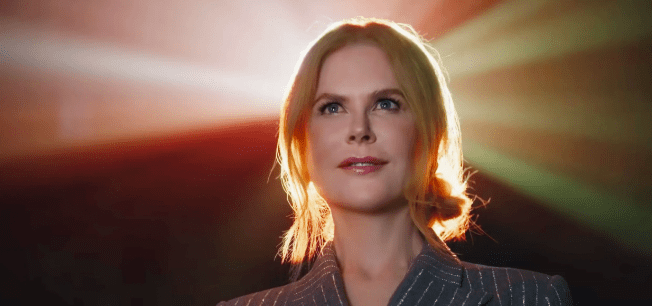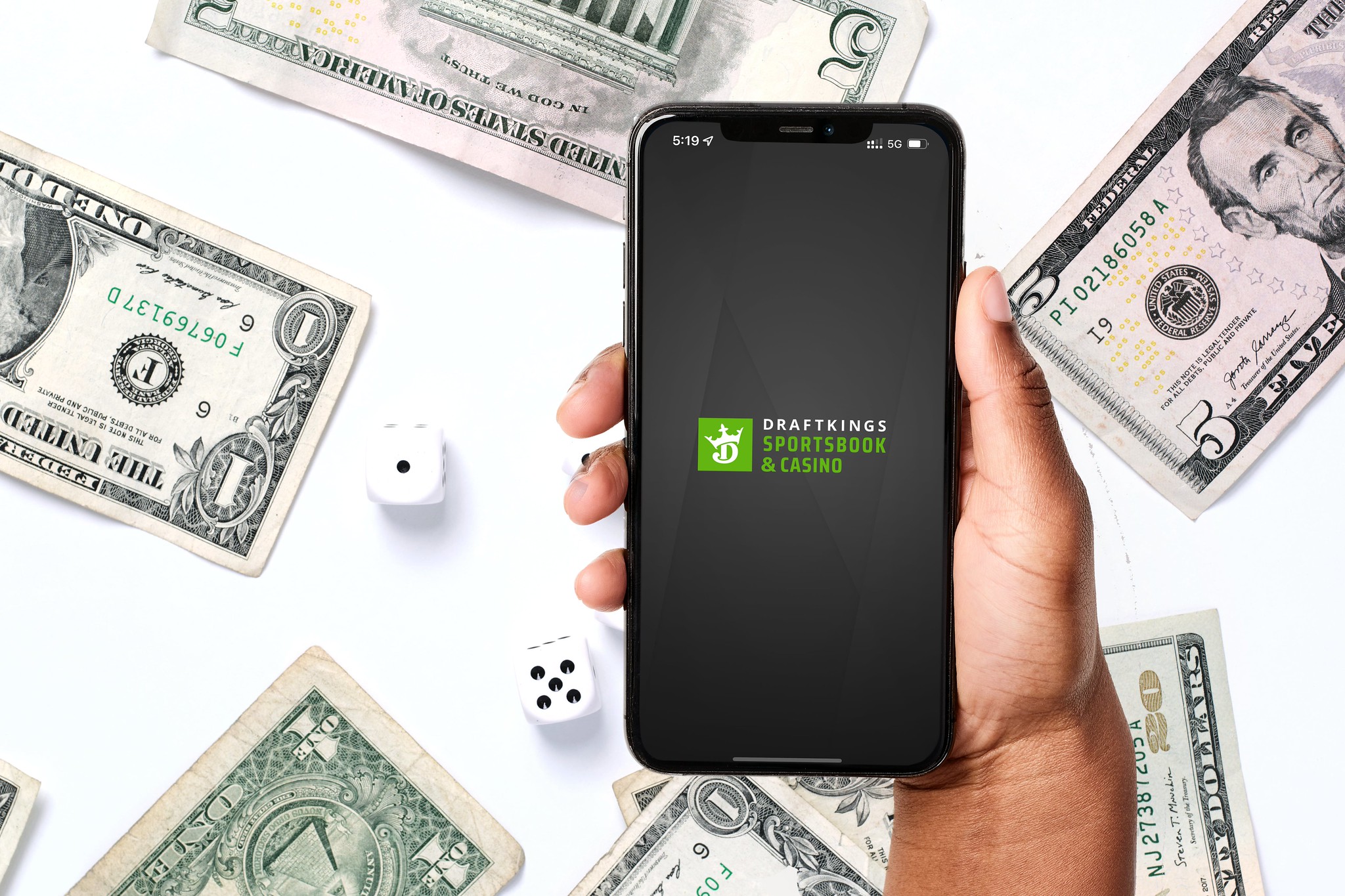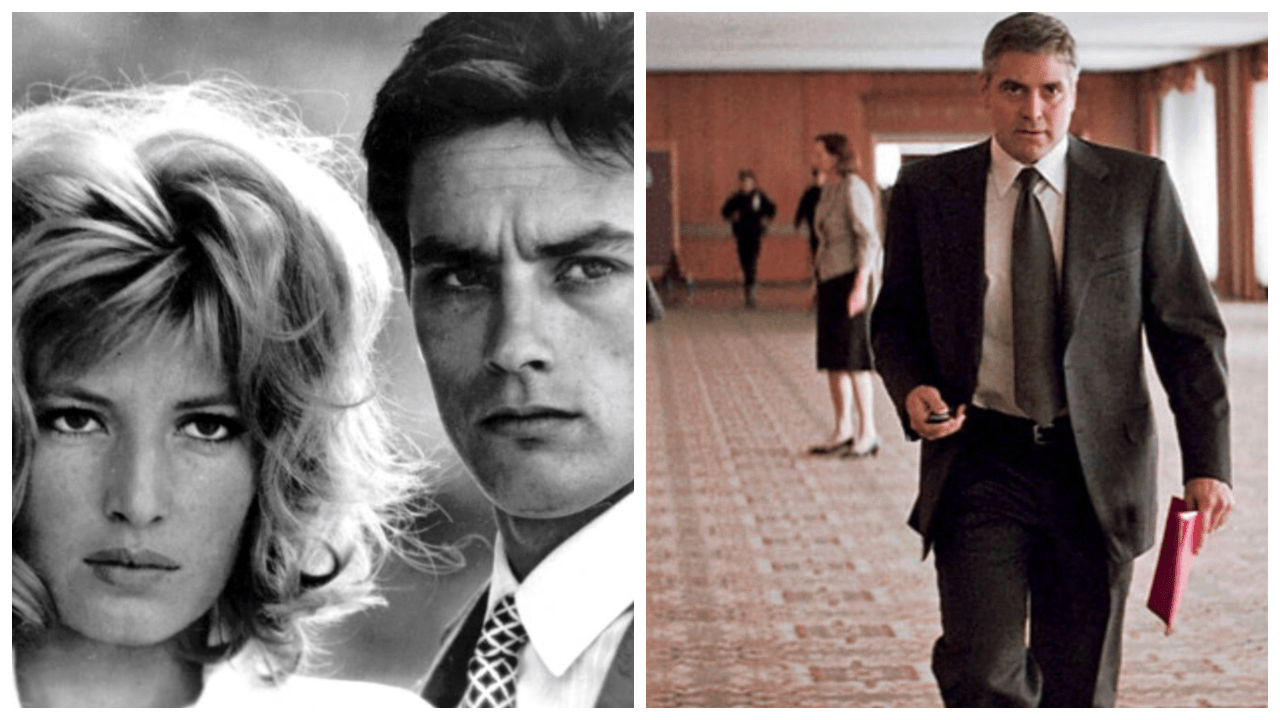I came to this place for magic.
Haha, not really. There are several reasons why I camped out last Sunday in a local AMC at a mall, the identity of which shall remain undisclosed to protect the jobs of the teens who did not rightfully eject me. None of these reasons were what you might call supernatural. I wanted to take the pulse of the multiplex in the lingering COVID era, to see if recent rumors of its good health were exaggerated. I wanted to see what ten hours of mainstream movies would do to my fragile brain. And, yes, I was curious to see if anyone would eventually ask the weird old guy darting from theater to theater all day if he had a ticket. Also, it looked like it would rain.
The experiment, in my hopeful mind, would combine the near-passive serendipity of channel-surfing with the adventurous roaming of a treasure hunt. Behind each door: a movie surprise! Often: a bad surprise! Impossibly often: Tom Cruise. For some reason, I couldn’t remember which theater Top Gun: Maverick was in. In fact, the whole day felt like a real-life game of Concentration, opening doors instead of flipping cards and trying to remember which film was playing where.
From the first screening at 1 p.m. till the joint shut down around 11, there I was. Strangely, I didn’t feel deadened or disoriented or overwhelmed by the end of the day. Instead, I could now see some of these movies more clearly. Consumed mostly in snackable 15-minute bites, the good moments stood out more strongly than ever, and the bad ones revealed their ideological bones and reliance on stale narrative devices more transparently. But before I go further, I must make one thing absolutely clear…
Disclaimer: Sneaking into movies is not a victimless crime. Don’t ask me who the victim is, but what I’m saying is that Racket in no way condones this activity, officer. I undertook this experiment solely for journalism, which makes it OK. Everything you do for journalism is OK. What’s your bank account number? It’s for journalism.
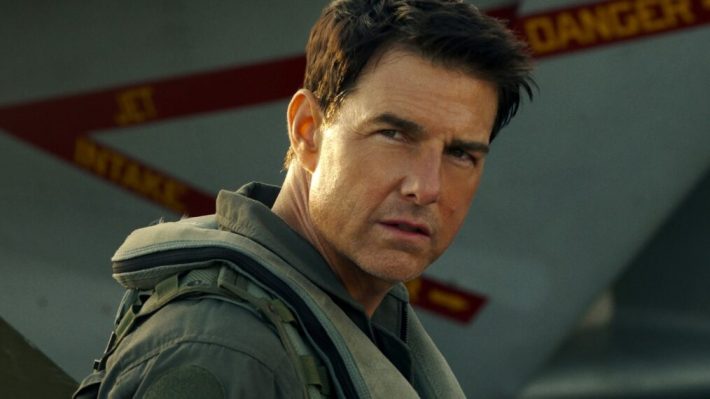
Lions and Vampires and Tom Cruise
Like any reasonable person, I decide to begin my day by watching Idris Elba fight a lion. Though I plan to dip in and out of most of the day’s fare, I will (and do) watch all of Beast. I figure it’ll be like laying down a good base at the fair before grazing indiscriminately. Unfortunately, that means right off I have to swallow one of Hollywood’s most tedious narrative cliches: The emotionally distant father who reconciles with his daughters by physically protecting them from an outside threat. Still, the actors do their best. Elba’s an under-utilized screen presence and Leah Jeffries and Iyana Halley turn in two winning performances as his daughters. And given that my day will be crammed with superheroes and other overachievers, it’s a relief Elba’s Nate Samuels has no special abilities, other than a doctor’s skills. He isn’t a secret assassin or a Navy SEAL in a past life. He’s just an ordinary guy. (Albeit one who looks like Idris Elba.) Naturally, the lion fucks him up.
Beast digested, it’s time to start opening doors with no knowledge of what entertainment or tedium awaits. And… my adventurous spirit is soon crushed by the forced jollity of Thor. This, let me remind you, is a movie there’s so little to say about I had to go meta when I reviewed it just to keep myself interested. When Natalie Portman responds to a green screen, one day to be filled with an excessively intricate yet expensively phony CGI palace of the gods, with nothing more eloquent than a “Holy shit!” I’m ready to hand screenwriting over to the bots. Not even Russell Crowe’s pudgy Zeus redeems this. Not even Chris Hemsworth’s bare ass helps. I’ve had enough of this holy shit.
Ducking out on a debate between the gods, a race in which I truly do not have a dog, I’m certain the next door will reveal something more… oh fuck, it’s Tom Cruise, his impassively rebellious grimace straining ever harder to convince us that it’s still a defiantly youthful grin. Somehow Top Gun: Maverick comes across as even more... ah, let’s say semi-fascist, when I only watch the ending than when I watched the whole thing. Their mission completed, the well-scrubbed victors congratulate themselves on whatever they did with a self-satisfaction that comes not from easy camaraderie but shared ideology. They could just as easily be peasants who just slaughtered kulaks to acquire a new tractor or good Germans returning home to their fräuleins after the Blitz.
I flee Top Gun, and now Nathalie Emmanuel is desperately seeking help in a village while wearing a gorgeous dress. The script of The Invitation, or at least the final third that I experience, seems dominated by loud noises and even louder music cues. But I piece together that some creepy old Brits are trying to turn her into a vampire (the supernatural kind, not the Tom Cruise kind) and I can’t totally blame them: She’d be a smokin’ queen of the undead. After bickering gods and flying aces, I welcome this palate-cleansing nonsense, which includes a fight between a couple of vampire babes and, when it ends, inspires one solitary brave person to clap loudly like Charles Foster Kane.
Among the questions I did not expect to ask today: If Julia Stiles falls off a roof and her head splatters on the pavement but there’s no one in the theater watching Orphan: First Kill, does it make a sound? I cannot answer that because I was in the theater, alone, and the sound it made was me laughing out loud. Other unintentionally intentional comedy includes some dude grabbing Esther, the psychopathic girl-woman the series is built around, throwing her down the stairs, and shouting “Just die, you freak!” Soon the house was on fire, which is how a certain kind of horror movie lets us know we’re in the home stretch. But the vibe is all off. Cheap-ass horror movies abhor a vacuum: There is nothing sadder than a screening of easy scare-fodder without a bunch of teens snorting at brutal murders while looking at their phones.
Intermission: The Inexplicable Nicole
It fascinates us because there’s really nothing to say about it, no way to interpret it, nothing to be revealed. There’s just something impeccably wrong about every carefully composed shot. Those high heels splashing in a puddle outside the theater. The celebration of returning to the shared entertainment experience of the movie theater being represented by an overdressed movie star sitting alone in an empty room. That face lighting up with some indistinct, platonic ideal of “enjoyment” no matter what movie she’s supposedly staring at. Her voice slipping from her native Australian into a prominent American accent for the climactic “Because here, they are.”
You can’t even process Nicole Kidman’s AMC ad as camp, but you can’t reduce its indelible wrongness to a joke. As we spend our days dunking on bad-faith idiots online, this remains an indigestible nugget of corporate propaganda. Its existence is a fluke miracle of corporate capitalism gone haywire, and we can only respond by repeating lines like “Somehow, heartbreak feels good in a place like this” like the well-worn koans we’re sure they are on some distant planet or in some alternate dimension.
I see Nicole less often than I’d like today, because I’m usually sneaking in toward the end of movies, and I miss her. Like the lion roaring before old MGM films, she gives that ruffle of anticipation that something is about to happen. Which is what this ridiculous ad was meant to do in the first place. So, uh, it works?
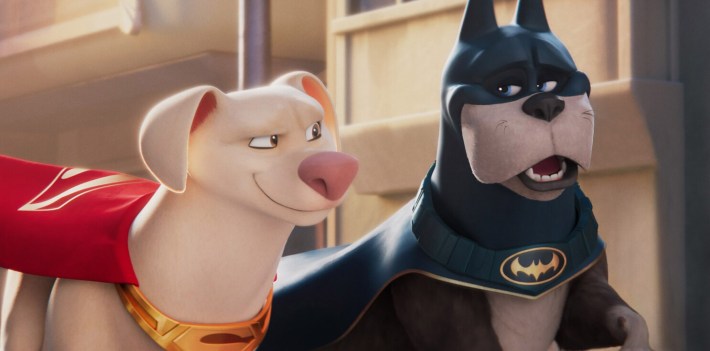
Round Two: Cartoons and Reruns and Endings
Because I’m not much on superheroes or, truth be told, pets, and I’m not a child, I’m not particularly thrilled to slip through the door just as Krypto the Superdog is preventing a meteorite from smashing into Metropolis. But I should be! DC League of Super-Pets earned the cute giggles I heard from its target audience, a welcome human response after a day of silent and non-existent audiences. I’m even a little disappointed that duty calls me to move on just as Superman breaks his promise to watch The Great British Bake Off with his pup for a date with Lois Lane.
The next door I open reveals that I seem to have entered the animated portion of the day, just as I myself am feeling somewhat less animated. As an uninitiated viewer and a non-gamer to whom Goku is but a name, I was concerned that I wouldn’t be able to follow Dragon Ball Super: Super Hero. Little did I know that the movie, or at least the first fifteen minutes or so that I catch, would be pure exposition. That’s not a complaint! For all I know the whole movie could be people explaining other Dragon Ball movies to each other, and that would be kind of a treat: A movie with the logic of a video game, where you’re told what you need to know as it goes on.
The bit of Dragon Ball I glimpse is hardly pulse-racing, but still Only Yesterday probably lowers my blood pressure by several—um, I don’t actually know what units you use to measure blood pressure. Two anime characters are discussing Japanese agriculture and reminiscing about their grade school plays—it’s like animated Rohmer, without any of that sexy business. Every system in my body—my circulatory system, my nervous system, maybe even one of those systems like the endocrine system that I don’t even know what the hell it does—needs this soothing bath of early ’90s Studio Ghibli, revived this week for its 30th anniversary. I’m so calm and composed now I’m ready for anything, even…
Elvis? Well, I agreed to enter this casino, gotta let the wheel spin. I walk in just as Tom Hanks’s devious Colonel Tom Parker muses, “He’s white.” (And I see—and hear—just enough to be convinced that if Hanks hasn’t delivered the worst performance by a major actor in a major film this decade, the others were so traumatic my memory has blocked them.) But Austin Butler does have charisma (even if it’s not always 100% Elvis-ish [Elvish?]) and the Louisiana Hayride scene that follows, where he transforms from a skinny kid into E-L-V-I-S and invents sex, is silly fun in its way. I couldn’t take it in full, but if Baz Luhrman made 15-minute films, I might even be able to handle his ADHD editing style.
And yet, I’ve seen so many of the bad movies inexplicably lingering in multiplex spots, I start to open the doors with hesitant dread. For instance, compared to the flawed Elvis, Where the Crawdads Sing is Clambake. I walked in on the worst of its several bad plots, with David Straiharn Gregory Pecking around a courtroom in a white suit while Daisy Edgar-Jones looks pitifully not guilty. I left before its ludicrous plot twist. (She’s guilty. Ruined it for ya. Not sorry.) After this, I desperately need popcorn, but I must wait for a movie I’m willing to settle into. A multiplex ninja like myself must travel light.
So instead of sating my need for grease-sponging kernels, I open another door and recognize, just from sheer unnecessary volume, that I must be re-experiencing Bullet Train. Brad Pitt is trying to stop the train. Michael Shannon was battling Hiroyuki Sanada with swords for some reason I’d quite forgotten. Everyone is shouting. Everyone is quipping. Everyone is just too much. Doesn’t anyone quietly discuss Japanese agriculture in the movies anymore?
When I walk into Fall, the story of two young women who climb a cell tower and can’t get down, one of the climbers is shoving a cell phone into a gaping wound in the other’s corpse like she’s a tauntaun or a Cronenberg character. Then she pushes the body off the tower so the authorities can find her text message and rescue her. I would like to point out that I am not the person in the theater who laughs at a falling body this time. The movie closes with a voice over: “Life is short. You have to do something that makes you feel alive.” Hmm, that’s not quite the message I’d have for the world after pushing my dead friend off a ledge, but ymmv, I guess. Me, to feel alive, I hide from bored teens working in multiplexes.
I see so many endings today. There must be a half-dozen movies I now know nothing about except how they end. But the one that disturbed me is from the John Boyega vehicle Breaking, the true story of Marine veteran turned bank robber Brian Brown-Easley. (I was not expecting to see Michael K. Williams today, him being dead and all, but apparently this was his final role.) I arrive just in time to see a police sniper take Boyega down while he’s robbing a bank. The remainder of the film is almost without dialogue, eerily so. There’s something about learning about a Black victim of police violence only after he dies, and missing the story of his life, that feels too much like the real world.
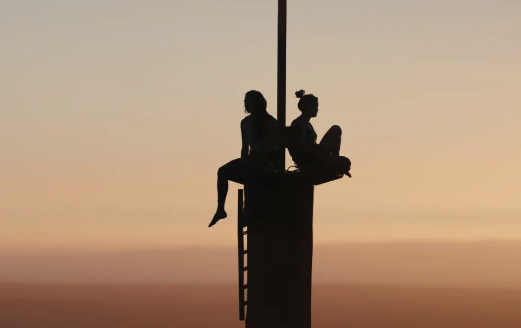
Intermission Two: The Lay of the Land
I get comfortable roaming through the theater as the day goes on. Maybe too comfortable. If I let my guard down, will some overzealous teen eager to prove his loyalty to his corporate masters choose to pounce on me, like the lion did to Idris Elba? Undaunted, I slip back to the lobby from a massive bucket of popcorn and a Coke, which nearly runs me $20. (Given my illicit circumstances, I have no right to complain.) Dare I later return for an unauthorized soda refill? I would never admit to such a crime in print.
Among the many, many, (many!) privileges of being a middle-aged white man, even an unkempt one who has yet to learn how to trim a beard, is that the likelihood of being confronted in this situation is pretty dang low—it might even be more embarrassing for the teen who had to collar me. (Note: Since I passed 50 my definition of “teen” has grown elastic, pretty much taking in anyone too young to rent a car. No offense to any 23-year-old AMClings.)
As for the theaters themselves, they fill in later in the afternoon and into the night. But there’s not much bustle. The difference in attendance between the blockbusters, which tend to fill up no matter how long they’ve overstayed their welcome (not to pick on Top Gun again, but who is still going to see it?) and the smaller films, which sometimes gather just two or three viewers.
There’s also a difference in projection quality from theater to theater. For instance, the bulb for the digital projector in Theater 2 needs to be changed—and I mean like yesterday. You especially notice the dimness the weak bulb causes when Black actors are involved, and unfortunately Beast and Nope are showing in there. You can hear every F-18 whoosh in Top Gun like you’re in the tower being buzzed, and the skies are as bright as all outdoors, but good luck making out Keke Palmer’s facial expressions.
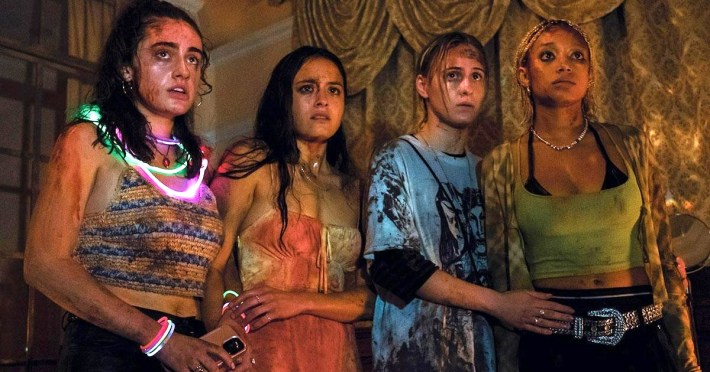
Round Three: Our Heroes Seem Like the Best Part of Us
Ooh, it’s Idris Elba again, this time bald and shirtless with Nosferatu ears and a generic “Middle Eastern” accent. A week ago I’d seen a preview screening of Three Thousand Years of Longing, George Miller’s lush, elaborate telling of the romance between an introverted narratologist (Tilda Swinton) and Elba’s lovelorn Djinn, expecting all sorts of clatter and clamor and clutter and multiverse nonsense. Instead, this easy-flowing meta-narrative, adapted from an A.S. Byatt story, feels postmodernly novelistic, in the vein of those bulky late 20th century fictions written under the besotted influence of literary structuralism and the Arabian Nights. (John Barth hive, what up?) I could quibble about its orientalist exoticism, but its fascination with feminine desire, its unhurried, very un-multiplexy luxuriance in stories within stories, is genuinely beguiling. This is the first movie today that I’d already seen that I was happy to revisit.
Next, I approach Bodies Bodies Bodies with trepidatious curiosity. Curiosity because smart people seemed to enjoy it, trepidation because the trailer made it seem like an endless stream of gags about “safe spaces” so stale they’d make Caitlyn Flanagan roll her eyes. But aside from one late-film dip into terminally online Zoomer jargon, there’s no clumsy generational skewering here. These are just people in their early 20s, a demographic that, for all its positive qualities, has been self-absorbed and irritating and hypersensitive for at least 30 years, which is when I belonged to it. Bodies Bodies Bodies is less a satire than a tense, loud treatise on how terrible circumstances don’t necessarily bring out the best in people. Plus we get to watch [SPOILER REDACTED] die from a gaping neck wound.
From its ghoulish Peter Cushing hologram to its super-powered Darth Vader to its uptight plot hole maintenance, Rogue One is as fan-servicey as any product manufactured by the Star Wars nostalgia machine. But it’s also the truest to the original movie’s spirit of underdogs striving for justice, before we were subjected to a tiresome saga of midichlorian-addled elites jockeying for mystical control over the galaxy. For once, we get a straightforward war story, which delays the outcome we all know has to happen with ever escalating odds and is aided by two leads with very beautiful eyes who are especially striking in their Imperial disguises. Of course, the reason I get to see Rogue One today is it’s been re-released to promote some new Disney channel nonsense. How weird to be semi-nostalgic for a moment when it seemed like the retro factory might occasionally produce something fun.
By the time the rebels blow up whatever it was that they needed to blow up, it’s nearly 11, the multiplex is mostly deserted, and the last movie playing, Nope, is already nearing the end. I am back in the accursed Theater 2, especially unkind to my tired eyes. But now, freed of the need to offer a take or interpretation of Jordan Peele’s puzzle-box sci-fi Western, I can simply enjoy the finale as a superb action sequence, complete with Keke Palmer’s Akira slide on her motorcycle. “The Haywoods are the first real heroes to emerge from a Peele film, or maybe they just inhabit the first Peele film capable of producing heroes,” I said it my original review, and this snippet reinforced that impression.
I then added “I wouldn’t say the message of Nope is anything as simple as ‘committed taciturn masculinity and female improvisational hustle need each other to get by,’” but you know what? Now I might say that it just is. I’m not a “hero” kind of guy myself, and I’ve a special aversion to the larger-than-life kind. But I can’t help but notice that Rogue One and Nope end my day, as it began, with ordinary people overcoming desperate odds, and the satisfaction that brings me. Maybe Nicole Kidman knows what she’s talking about. Maybe our heroes feel like the best parts of us after all. All I know is that when she says that she sure ain’t talking about Top Gun.
